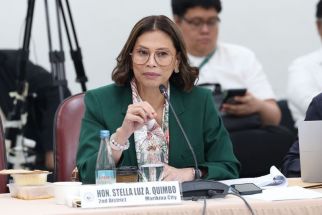Negros Oriental’s different views on political dynasty
DUMAGUETE CITY, Philippines – A cross section of the community in Dumaguete City and the province of Negros Oriental are divided in their views on political dynasties amid ongoing debates on its constitutionality and relentless calls for a halt to such practice in the Philippines.
City Vice Mayor Alan Gel Cordova, who is running for mayor in 2013 against incumbent Mayor Manuel Sagarbarria, pointed out that political dynasty is “discouraged by our Constitution.”
A lawyer and a graduate of the West Point Military Academy in the US, Cordova said an enabling law is needed to be passed by Congress to give teeth to this constitutional provision, “but for whatever reason ..., Congress has not passed any such law. Until then, there is no legal definition of a political dynasty and its corresponding consequences.”
Sagarbarria, for his part, said he does not believe in political dynasty because not one politician is exactly the same with the other. “There are good leaders serving the government with the same family names but they have shown good performance and brought development to the community. Why restrict a person if he wants to serve even if they have the same family name,” he said.
City Councilor Antonio Remollo, who comes from a family of politicians, said political dynasty can be good for as long as they (politicians) are good leaders, there are no others to do the good they are doing and they win not because of their money but because their constituents want them in public service.
Margarito “Gary” Teves, former finance secretary of the Arroyo administration and former congressman of Negros Oriental, also agrees that an enabling legislation is needed, in reaction to Senate Bill 2649 authored by Senator Miriam Defensor Santiago.
Teves, who is running for governor of Negros Oriental in 2013, said there is still no operational terms for political dynasty, but he clarified that, if the bill is passed, the people must respect and follow it.
In Negros Oriental, the Teves family has been in power for generations, but the former secretary said it is the people who should decide, and the voters always have a choice as to who they elect into office, making wise choices based on merit and dedication to genuine public service.
“Political dynasties are not necessarily bad. If you put restrictions on a qualified person because he or she is related to an incumbent, you are limiting that person’s chance to serve the public,” said Gary whose father, Herminio Teves, served as congressman for several terms in the past.
Gary’s nephew is incumbent Rep. Henry Pryde Teves (3rd district) who is the brother of PB Member Arnulfo Teves Jr. All three of them are running for various positions in the 2013 polls.
Representative Teves admitted that their family has been in politics for decades but he would rather call it a political family, not a political dynasty. Having the same family name in politics is not something new in the country because it is even present in other countries, he said, adding that the challenge for the younger generation in their family is to perform better and having the character to reach out to the community.
Also coming from a family of politicians, Rep. George Arnaiz (2nd district) believes that if there will be a law on political dynasties, it should be fair, equal and applicable to all. His brother, Apolinario Arnaiz, Jr. is the incumbent vice governor of Negros Oriental, and his other brother, Apollo Arnaiz, is the incumbent mayor of the family’s hometown of Pamplona.
A former journalist and now a freelance communications specialist and consultant, Andrea Trinidad Echavez says she is not in favor of political dynasties. “No family has the monopoly of serving the people. Political dynasties encourage patronage politics, whether we like it or not,” she said.
Echavez, who also comes from a political family in Guihulngan City, Negros Oriental, where political dynasties are strongly perceived by many, the local parlance “No Vote, Ibot” is just one of the evident outcomes of political dynasties. Her family is related to many politicians in Guihulngan so that it is sometimes a dilemma as to who they should be supporting. “No Vote, Ibot” is a term coined for those who stand losing their jobs (“ibot” in Cebuano means to remove) if they failed to vote for a certain politician in an election.
Reverend Fr. Archie Toroy of the Diocese of Dumaguete said he is against political dynasty as it “does not promote the check and balance in terms of political interests, e.g. projects, health care, environmental concerns, and drug-related issues among others.
Toroy further noted that political dynasties do not promote renewal and reformation in the government leadership. “The ‘family ties’ mentality of the Filipinos makes it very hard to correct the wrongdoings of family members serving in political positions,” he said, adding that political dynasty does not promote the sense of giving other Filipinos the chance to exercise their leadership skills in the country.”
Ricky Soler, Jr., a businessman from Bais City, Negros Oriental, does not favor political dynasties due to “the tendency of dynasties to centralize powers and influence to a particular family, thereby protecting their own interests over that of the public.”
Soler however added: “In the end, it is the voter who decides and by the voters giving them (politicians) the mandate to rule how can you take that away from them? One can also argue that to disqualify a person from running only because he or she has the misfortune or fortune to be related to another official would be discriminatory,” he said.
Roy Bustillo, president of the local chapter of the Kapisanan Ng Mga Brodkaster sa Pilipinas, said he believes political dynasty does not exist in the Philippines, even at the local level. “It is a misnomer to associate political dynasty to corruption, which is the common understanding of the community,” he said.
Bustillo said there are the same family names in politics but they have shown good and honest leadership to the people. “The challenge is for the people to choose the rightful leader,” he added. —(FREEMAN)
- Latest
- Trending



















